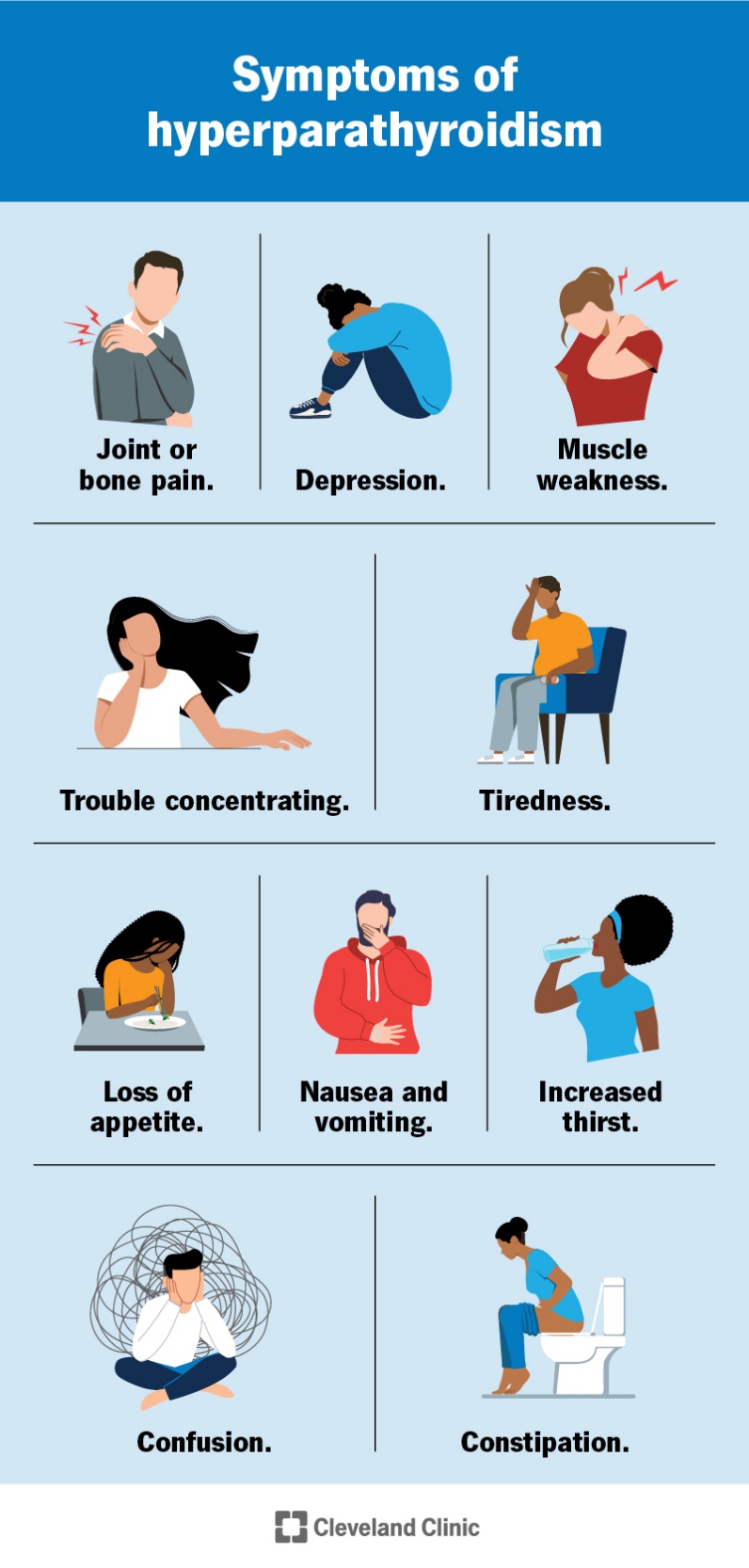A 55-year-old female presents with symptoms of fatigue, muscle weakness, and depression. Laboratory results reveal elevated calcium levels and increased parathyroid hormone (PTH) levels. Which of the following is the most likely cause of her hyperparathyroidism?
Adenoma of the parathyroid gland.
Thyroid carcinoma.
Vitamin D deficiency.
Chronic kidney disease.
The Correct Answer is A
Choice A Reason:
An adenoma of the parathyroid gland is the most common cause of primary hyperparathyroidism. This benign tumor leads to the overproduction of parathyroid hormone (PTH), which in turn causes elevated calcium levels in the blood. The excessive PTH secretion disrupts the normal calcium balance, leading to symptoms such as fatigue, muscle weakness, and depression. Parathyroid adenomas account for approximately 80% of primary hyperparathyroidism cases.
Choice B Reason:
Thyroid carcinoma is a type of cancer that originates in the thyroid gland, not the parathyroid glands. While thyroid carcinoma can cause various symptoms, it does not typically lead to elevated PTH levels or hyperparathyroidism. Therefore, it is not the most likely cause of the patient’s condition.
Choice C Reason:
Vitamin D deficiency can lead to secondary hyperparathyroidism, where low levels of vitamin D cause decreased calcium absorption, prompting the parathyroid glands to produce more PTH to maintain calcium levels. However, this condition is usually associated with low or normal calcium levels, not elevated calcium levels as seen in this patient. Therefore, it is not the most likely cause of her hyperparathyroidism.
Choice D Reason:
Chronic kidney disease (CKD) can also cause secondary hyperparathyroidism due to impaired kidney function, which affects calcium and phosphate balance and vitamin D metabolism. However, similar to vitamin D deficiency, CKD-related hyperparathyroidism typically presents with low or normal calcium levels rather than elevated levels. Thus, it is not the most likely cause in this scenario.

Nursing Test Bank
Naxlex Comprehensive Predictor Exams
Related Questions
Correct Answer is ["A","C","D"]
Explanation
Choice A Reason:
Encouraging a high-sodium diet is essential for patients with Addison’s disease because they often suffer from hyponatremia (low sodium levels) due to the lack of aldosterone, a hormone that helps regulate sodium and potassium balance. Increasing sodium intake helps to counteract this deficiency and maintain proper electrolyte balance.
Choice B Reason:
Administering potassium supplements is not recommended for patients with Addison’s disease because they already have hyperkalemia (high potassium levels) due to the lack of aldosterone. Adding more potassium could exacerbate this condition and lead to serious complications such as cardiac arrhythmias.
Choice C Reason:
Administering intravenous corticosteroids is a critical intervention for managing Addison’s disease, especially during an adrenal crisis. Corticosteroids like hydrocortisone help replace the deficient hormones and stabilize the patient’s condition by reducing inflammation and supporting metabolic functions.
Choice D Reason:
Monitoring blood glucose levels regularly is important because patients with Addison’s disease can experience hypoglycemia (low blood sugar levels) due to cortisol deficiency. Regular monitoring helps in timely detection and management of hypoglycemia, preventing potential complications.
Choice E Reason:
Administering diuretics is not appropriate for patients with Addison’s disease as it can lead to further electrolyte imbalances, particularly worsening hyponatremia and hyperkalemia. Diuretics increase the excretion of sodium and potassium, which is counterproductive in managing Addison’s disease.
Correct Answer is B
Explanation
Choice A Reason:
Advising the patient to increase their screen time to exercise their eye muscles is not appropriate for managing macular degeneration. Increased screen time can cause eye strain and does not benefit the condition. Instead, patients should be encouraged to engage in activities that do not exacerbate eye strain.
Choice B Reason:
Encouraging the patient to quit smoking is a crucial intervention for managing macular degeneration. Smoking is a significant risk factor for the progression of macular degeneration. Quitting smoking can help slow the progression of the disease and improve overall eye health. This intervention addresses a modifiable risk factor and can have a positive impact on the patient’s condition.
Choice C Reason:
Suggesting the patient avoid all physical activities to prevent further eye damage is not necessary for managing macular degeneration. Physical activity is important for overall health and does not directly impact the progression of macular degeneration. Patients should be encouraged to maintain a healthy lifestyle, including regular physical activity.
Choice D Reason:
Informing the patient to reduce their water intake to prevent fluid accumulation in the eyes is not relevant for managing macular degeneration. Adequate hydration is important for overall health, and there is no evidence to suggest that reducing water intake will benefit patients with macular degeneration. This advice could potentially lead to dehydration and other health issues.
Whether you are a student looking to ace your exams or a practicing nurse seeking to enhance your expertise , our nursing education contents will empower you with the confidence and competence to make a difference in the lives of patients and become a respected leader in the healthcare field.
Visit Naxlex, invest in your future and unlock endless possibilities with our unparalleled nursing education contents today
Report Wrong Answer on the Current Question
Do you disagree with the answer? If yes, what is your expected answer? Explain.
Kindly be descriptive with the issue you are facing.
